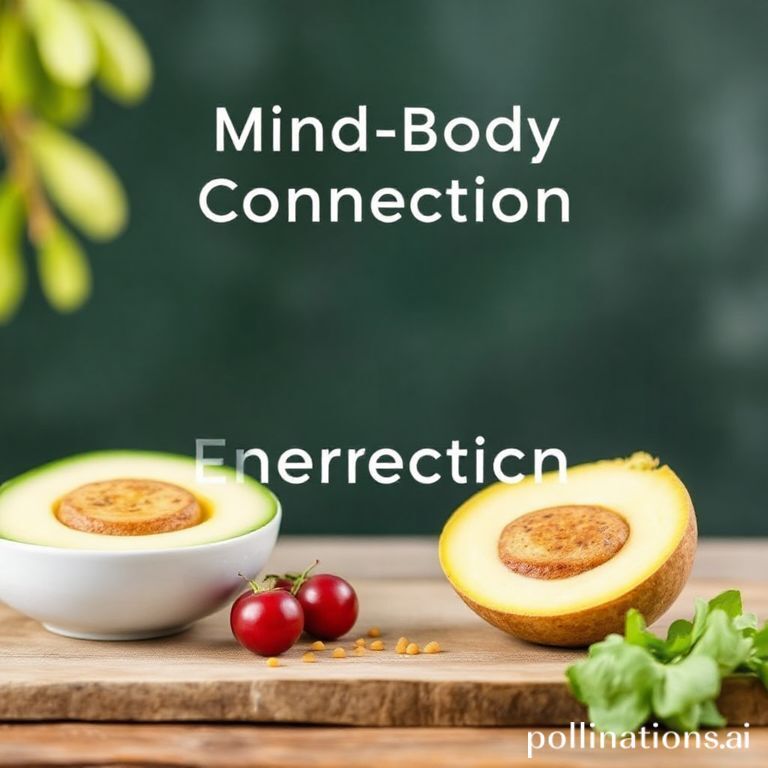Mindful Food Energetics is a holistic approach to nutrition that emphasizes the energetic properties of food. It recognizes that food is not just a source of calories, but also a source of energy that can affect our physical, emotional, and spiritual well-being.
By grasping the energetic properties of food, we can make more informed choices about what we eat and how we prepare it. This approach takes into account factors such as seasonality, cooking methods, and food combinations to optimize the energy we receive from our food.
Mindful Food Energetics is a powerful tool for promoting health and vitality, and can be easily integrated into any lifestyle.
The Basics of Mindful Eating
1. How to practice mindful eating for better food energetics
Mindful eating is a practice that involves paying full attention to the experience of eating and drinking, both inside and outside the body. By practicing mindful eating, you can empower your connection with food and improve your overall wellbeing.
In regard to practicing mindful eating for better food energetics, it’s important to start by cultivating awareness. Before you even take a bite, take a moment to observe the colors, textures, and smells of your food. Engage your senses fully to appreciate the beauty and nourishment that the food provides.
Once you start eating, focus on each bite. Chew slowly and savor the flavors and textures. Allow yourself to truly taste and enjoy the food. Avoid distractions such as watching TV or scrolling through your phone, as they can take away from the mindful eating experience.
In addition to being present in the moment, mindful eating also involves listening to your body’s hunger and fullness cues. Pay attention to your body’s signals of hunger and eat until you feel satisfied, not overly full. This can help prevent overeating and promote a healthier relationship with food.
2. Mindful eating techniques to empower your wellbeing
Mindful eating techniques can be powerful tools to intensify your wellbeing and promote a healthier relationship with food. Imbibing these techniques into your daily life can help you develop a more mindful and intuitive approach to eating.
One technique to optimize your wellbeing through mindful eating is to practice gratitude. Before each meal, take a moment to express gratitude for the food you are about to eat. Reflect on the effort and resources that went into producing the food, and appreciate the nourishment it provides.
Another technique is to eat without distractions. Create a peaceful and mindful eating environment by turning off the TV, putting away your phone, and sitting down at a table. This allows you to fully focus on the experience of eating and promotes mindful awareness.
Additionally, mindful portion control can be a helpful technique. Instead of mindlessly filling your plate, pay attention to your body’s hunger and fullness cues. Serve yourself smaller portions and take the time to savor each bite. This can help prevent overeating and promote a healthier balance.
Finally, mindful eating can also involve pioneering the emotional aspects of eating. Pay attention to your emotions and thoughts around food. Are you eating out of boredom, stress, or comfort? By bringing awareness to these emotional triggers, you can develop healthier coping mechanisms and make more conscious choices.
| Mindful Eating Benefits | Mindful Eating Techniques |
|---|---|
| Improved digestion: Mindful eating promotes slower and more thorough chewing, which aids in digestion. | Gratitude practice: Express gratitude for the food before each meal. |
| Weight management: By paying attention to hunger and fullness cues, mindful eating can help prevent overeating and support weight management. | Eating without distractions: Create a peaceful environment by turning off distractions and sitting down at a table. |
| Enhanced enjoyment of food: Mindful eating allows you to fully savor and appreciate the flavors and textures of your food. | Mindful portion control: Serve smaller portions and savor each bite. |
| Reduced emotional eating: By bringing awareness to emotional triggers, mindful eating can help reduce mindless eating in response to emotions. | Probing emotional aspects of eating: Pay attention to emotions and thoughts around food. |

The Impact of Food on Energy Levels
Foods that Boost Energy and Vitality
Eating the right foods can have a significant impact on your energy levels and overall vitality. Here are some key foods that can help boost your energy:
- Whole grains: Coalescing whole grains into your diet, such as brown rice and quinoa, can provide a steady release of energy throughout the day.
- Lean proteins: Foods like chicken, fish, and tofu are excellent sources of lean protein, which can provide sustained energy and promote muscle growth and repair.
- Fruits and vegetables: Fresh fruits and vegetables are rich in essential nutrients and antioxidants that can increase energy levels and support overall health.
- Nuts and seeds: Snacking on nuts and seeds, such as almonds and chia seeds, can provide a quick energy boost due to their high content of healthy fats, protein, and fiber.
- Healthy fats: Including sources of healthy fats, like avocados and olive oil, in your meals can help regulate blood sugar levels and provide long-lasting energy.
Foods to Avoid for Optimal Energy Balance
During certain foods can boost energy, others can have the opposite effect. Here are some foods to avoid for optimal energy balance:
- Sugary snacks and drinks: Consuming sugary snacks and drinks can lead to a rapid increase in blood sugar levels followed by a crash, leaving you feeling tired and drained.
- Processed foods: Processed foods, such as fast food and packaged snacks, are often high in unhealthy fats, sodium, and sugar, which can negatively impact energy levels.
- Excessive caffeine: During a moderate amount of caffeine can provide a temporary energy boost, consuming too much can disrupt sleep patterns and lead to energy crashes.
- Alcohol: Alcohol is a depressant that can impair sleep quality and leave you feeling fatigued the next day.
- Highly refined carbohydrates: Foods like white bread, pasta, and pastries can cause blood sugar spikes and subsequent energy crashes.
By making conscious choices about the foods you consume, you can optimize your energy levels and maintain vitality throughout the day. Remember to prioritize nutrient-dense foods that provide sustained energy and avoid those that can cause energy fluctuations.
Mindful Food Choices for a Balanced Diet
In regard to maintaining a balanced diet, making mindful food choices is crucial. By melding whole, unprocessed foods into your daily meals, you can provide your body with the essential nutrients it needs to thrive.
1. Embedding whole, unprocessed foods into your diet
Whole, unprocessed foods are the foundation of a healthy diet. These foods are rich in vitamins, minerals, and fiber, and they provide sustained energy throughout the day. Some examples of whole, unprocessed foods include:
- Fruits: Incorporate a variety of fruits into your diet to enjoy the natural sweetness and benefits of different vitamins and antioxidants.
- Vegetables: Fill your plate with colorful vegetables to ensure a diverse range of nutrients and phytochemicals.
- Whole grains: Opt for whole grains like brown rice, quinoa, and whole wheat bread to increase your fiber intake and promote digestive health.
- Lean proteins: Choose lean sources of proteins such as chicken, fish, tofu, and legumes to support muscle growth and repair.
2. The role of fruits and vegetables in mindful food energetics
Fruits and vegetables play a vital role in mindful food energetics. They are packed with essential vitamins, minerals, and antioxidants that nourish your body and support overall well-being. Additionally, the vibrant colors of fruits and vegetables indicate the presence of different phytochemicals, each offering unique health benefits.
- Antioxidants: Fruits and vegetables are rich in antioxidants, which help protect your cells from damage caused by free radicals.
- Fiber: These foods are also excellent sources of fiber, promoting healthy digestion and preventing constipation.
- Hydration: Many fruits and vegetables have high water content, aiding in hydration and promoting healthy skin.
- Nutrient density: Fruits and vegetables are low in calories but high in essential nutrients, making them an ideal choice for a balanced diet.

The Mind-Body Connection in Mindful Food Energetics
In the realm of mindful food energetics, the mind-body connection plays a vital role in shaping our food choices and energy levels. Perceiving how emotions can influence what we eat and how it affects our overall wellbeing is key to achieving emotional balance and a healthier lifestyle.
1. How Emotions Affect Our Food Choices and Energy Levels
Emotions have a profound impact on our food choices. When we experience stress, anxiety, or sadness, it is common to turn to comfort foods that provide temporary relief. These foods are often high in sugar, unhealthy fats, and processed ingredients, which can lead to energy crashes and feelings of lethargy.
Contrarily, positive emotions such as joy and contentment can inspire us to make healthier food choices. When we are in a positive state of mind, we are more likely to opt for nourishing foods that fuel our bodies and provide sustained energy throughout the day.
2. Mindful Eating for Emotional Balance and Overall Wellbeing
Mindful eating is a powerful practice that can help cultivate emotional balance and amplify our overall wellbeing. By being fully present and aware of our eating experience, we can develop a deeper perceiving of our body’s needs and make choices that align with our physical and emotional state.
When practicing mindful eating, we can engage all our senses and truly savor each bite. This allows us to tune in to our body’s signals of hunger and fullness, preventing overeating or mindless snacking driven by emotions.
Moreover, mindful eating encourages us to cultivate a compassionate and non-judgmental attitude towards ourselves and our food choices. By letting go of guilt or shame associated with certain foods, we can develop a healthier relationship with food and nourish our bodies in a way that supports our emotional wellbeing.
| Topic | Key Points |
|---|---|
| Emotions and Food Choices | – Emotions influence food choices – Comfort foods and energy crashes – Positive emotions and healthier choices |
| Mindful Eating | – Being present and aware – Listening to body’s signals – Cultivating a compassionate attitude |

Mindful Food Energetics and Weight Management
Mindful food energetics and weight management are crucial aspects of maintaining a healthy lifestyle. By practicing mindful eating, individuals can achieve and sustain their desired weight. This section explores the concepts of mindful eating and provides valuable insights into making mindful food choices for sustainable weight loss or gain.
Achieving and maintaining a healthy weight through mindful eating
Mindful eating is a practice that involves paying full attention to the eating experience, including the taste, smell, and texture of food. By cultivating mindfulness during meals, individuals can develop a deeper connection with their bodies and better understand their hunger and satiety cues. This awareness allows for a more balanced and intuitive approach to eating, ultimately leading to achieving and maintaining a healthy weight.
Mindful food choices for sustainable weight loss or gain
Touching on weight management, making mindful food choices is essential. By consciously selecting nutrient-dense foods that nourish the body, individuals can support their weight loss or gain goals in a sustainable manner. Assimilating a variety of fruits, vegetables, whole grains, and lean proteins into the diet ensures a well-rounded intake of essential nutrients.
Additionally, integral to be aware of portion sizes and practice moderation. By listening to the body’s signals of hunger and fullness, individuals can avoid overeating and maintain a healthy balance. Mindful food choices also involve being mindful of emotional eating triggers and finding alternative ways to cope with stress or negative emotions.
An example of a mindful food choice is opting for a colorful salad with mixed greens, cherry tomatoes, cucumber, and grilled chicken breast. This nutritious meal provides a good balance of carbohydrates, protein, and fiber, keeping you satiated and energized throughout the day.
Benefits of Mindful Food Energetics and Weight Management:
- Improved overall well-being: Mindful eating promotes a holistic approach to health and wellness, leading to improved physical, mental, and emotional well-being.
- Enhanced digestion: By slowing down and savoring each bite, mindful eating aids in proper digestion and nutrient absorption.
- Increased self-awareness: Mindful food choices cultivate self-awareness and empower individuals to make conscious decisions that align with their health goals.
- Long-term weight maintenance: By developing a mindful eating practice, individuals can sustain their desired weight in the long run, avoiding yo-yo dieting and its associated negative effects.
| Food Group | Serving Size | Calories | Protein | Carbohydrates | Fat |
|---|---|---|---|---|---|
| Mixed Greens | 2 cups | 20 | 2g | 4g | 0.2g |
| Cherry Tomatoes | 1 cup | 25 | 1g | 6g | 0.3g |
| Cucumber | 1/2 cup sliced | 8 | 0.3g | 2g | 0.1g |
| Grilled Chicken Breast | 3 oz | 142 | 26g | 0g | 3g |
Read More:
1. Mindful Bites: Chakra-Inspired Food Choices
2. Chakra Awareness: Nourish with Intention